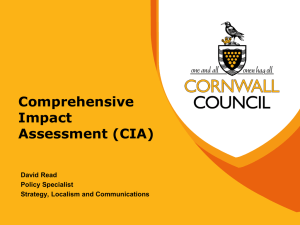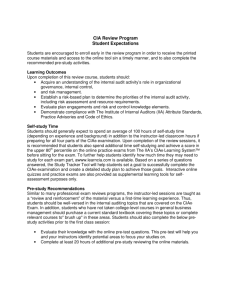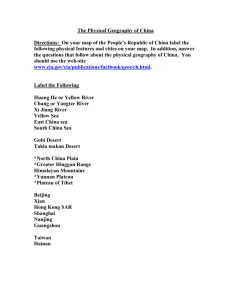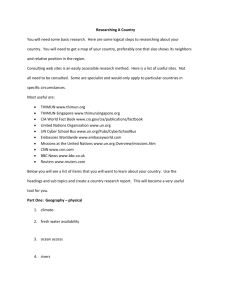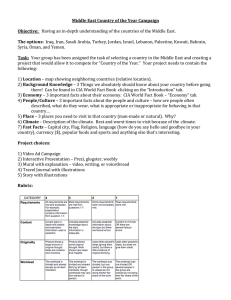GAO Testimony
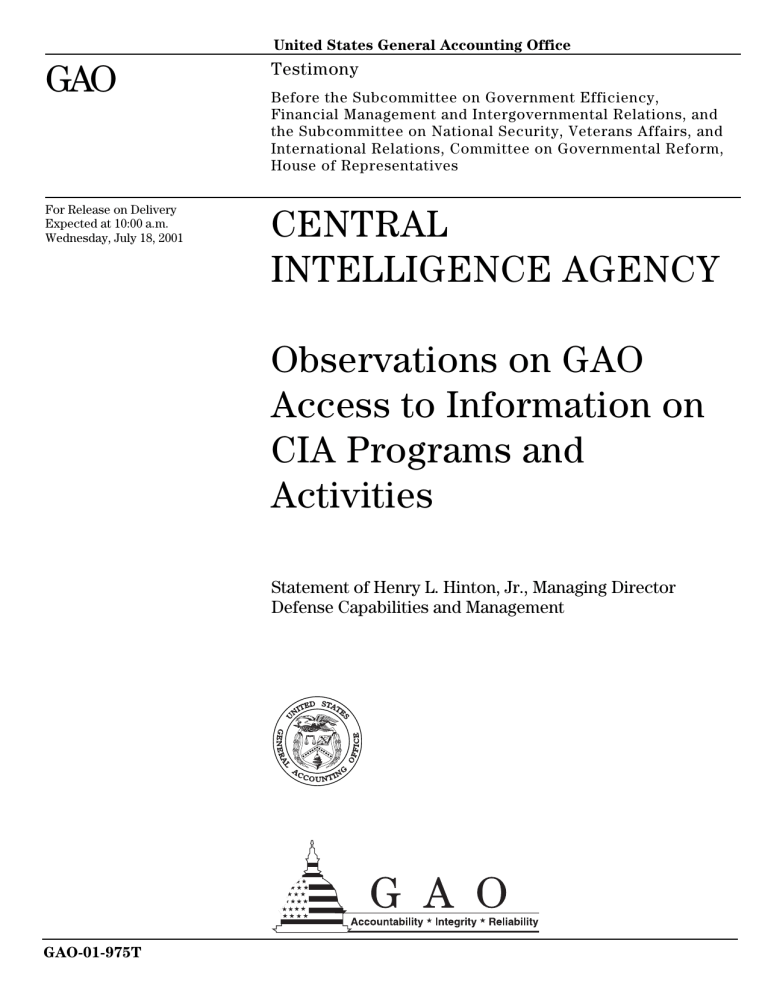
GAO
For Release on Delivery
Expected at 10:00 a.m.
Wednesday, July 18, 2001
United States General Accounting Office
Testimony
Before the Subcommittee on Government Efficiency,
Financial Management and Intergovernmental Relations, and the Subcommittee on National Security, Veterans Affairs, and
International Relations, Committee on Governmental Reform,
House of Representatives
CENTRAL
INTELLIGENCE AGENCY
Observations on GAO
Access to Information on
CIA Programs and
Activities
Statement of Henry L. Hinton, Jr., Managing Director
Defense Capabilities and Management
GAO-01-975T
Summary
Background
Messrs. Chairmen and Members of the Subcommittees:
We are pleased to be here to discuss the subject of access by the General
Accounting Office (GAO) to information from the Central Intelligence
Agency (CIA). Specifically, our statement will provide some background on CIA and its oversight mechanisms, our authority to review CIA programs, and the history and status of GAO access to CIA information. As requested, our remarks will focus on our relationship with the CIA and not with other intelligence agencies. Our comments are based upon our review of historic files, our legal analysis, and our experiences dealing with the
CIA over the years.
Oversight of the CIA generally comes from two select committees of
Congress and the CIA’s Inspector General. We have broad authority to evaluate CIA programs. In reality, however, we face both legal and practical limitations on our ability to review these programs. For example, we have no access to certain CIA “unvouchered” accounts and cannot compel our access to foreign intelligence and counterintelligence information. In addition, as a practical matter, we are limited by the CIA’s level of cooperation, which has varied through the years. We have not actively audited the CIA since the early 1960s, when we discontinued such work because the CIA was not providing us with sufficient access to information to perform our mission. The issue has arisen since then from time to time as our work has required some level of access to CIA programs and information. However, given a lack of requests from the
Congress for us to do specific work at the CIA and our limited resources, we have made a conscious decision not to further pursue the issue.
Today, our dealings with the CIA are mostly limited to requesting information that relates either to governmentwide reviews or analyses of threats to U.S. national security on which the CIA might have some information. The CIA either provides us with the requested information, provides the information with some restrictions, or does not provide the information at all. In general, we are most successful at getting access to
CIA information when we request threat assessments and the CIA does not perceive our audits as oversight of its activities.
As you know, the General Accounting Office is the investigative arm of the
Congress and is headed by the Comptroller General of the United States— currently David M. Walker. We support the Congress in meeting its constitutional responsibilities and help improve the performance and
Page 1 GAO-01-975T GAO Access to CIA
accountability of the federal government for the American people. We examine the use of public funds, evaluate federal programs and activities, and provide analyses, options, recommendations, and other assistance to help the Congress make effective oversight, policy, and funding decisions.
Almost 90 percent of our staff days are in direct support of Congressional requestors, generally on the behalf of committee chairmen or ranking members.
The U.S. Intelligence Community consists of those Executive Branch agencies and organizations that work in concert to carry out our nation’s intelligence activities.
1 The CIA is an Intelligence Community agency established under the National Security Act of 1947 to coordinate the intelligence activities of several U.S. departments and agencies in the interest of national security. Among other functions, the CIA collects, produces, and disseminates foreign intelligence and counterintelligence; conducts counterintelligence activities abroad; collects, produces, and disseminates intelligence on foreign aspects of narcotics production and trafficking; conducts special activities approved by the President; and conducts research, development, and procurement of technical systems and devices.
Oversight of CIA Activities
Currently, two congressional select committees and the CIA’s Inspector
General oversee the CIA’s activities. The Senate Select Committee on
Intelligence was established on May 19, 1976, to oversee the activities of the Intelligence Community. Its counterpart in the House of
Representatives is the House Permanent Select Committee on Intelligence, established on July 14, 1977. The CIA’s Inspector General is nominated by the President and confirmed by the Senate. The Office of the Inspector
General was established by statute in 1989 and conducts inspections, investigations, and audits at headquarters and in the field. The Inspector
General reports directly to the CIA Director. In addition, the President’s
Foreign Intelligence Advisory Board assesses the quality, quantity, and adequacy of intelligence activities. Within the Board, there is an intelligence oversight committee that prepares reports on intelligence activities that may be unlawful or otherwise inappropriate. Finally, the
Congress can charter commissions to evaluate intelligence agencies such
1
The Intelligence Community includes the Office of the Director of Central Intelligence, the
CIA, the National Security Agency, the National Imagery and Mapping Agency, the National
Reconnaissance Office, the Defense Intelligence Agency, and other offices and services within the Departments of Defense, State, Justice, Treasury, and Energy.
Page 2 GAO-01-975T GAO Access to CIA
as CIA. One such commission was the Commission on the Roles and
Capabilities of the United States Intelligence Community, which issued a report in 1996.
GAO’s Authority to
Review CIA Programs
Generally, we have broad authority to evaluate agency programs and investigate matters related to the receipt, disbursement, and use of public money. To carry out our audit responsibilities, we have a statutory right of access to agency records. Federal agencies are required to provide us information about their duties, powers, activities, organization, and financial transactions. This requirement applies to all federal agencies, including the CIA. Our access rights include the authority to file a civil action to compel production of records, unless (a) the records relate to activities the President has designated as foreign intelligence or counterintelligence activities, (b) the records are specifically exempt from disclosure by statute, or (c) the records would be exempt from release under the Freedom of Information Act because they are predecisional memoranda or law enforcement records and the President or Director of the Office of Management and Budget certifies that disclosure of the record could be expected to impa ir
substantially the operations of the government.
The National Security Act of 1947 charges the CIA Director with protecting intelligence sources and methods from unauthorized disclosure. In terms of our statutory access authority, however, the law creates only one specific exemption: the so-called “unvouchered” accounts. The exemption pertains to expenditures of a confidential, extraordinary, or emergency nature that are accounted for solely on the certification of the Director.
These transactions are subject to review by the intelligence committees.
Amendments to the law require the President to keep the intelligence committees fully and currently informed of the intelligence activities of the
United States. The CIA has maintained that the Congress intended the intelligence committees to be the exclusive means of oversight of the CIA, effectively precluding oversight by us.
While we understand the role of the intelligence committees and the need to protect intelligence sources and methods, we also believe that our authorities are broad enough to cover the management and administrative functions that the CIA shares with all federal agencies.
We have summarized the statutes relevant to our relationship with the CIA in an appendix attached to this testimony.
Page 3 GAO-01-975T GAO Access to CIA
GAO’s Access to the
CIA Has Been Limited
We have not done audit work at the CIA for almost 40 years. Currently, our access to the CIA is limited to requests for information that relates either to governmentwide reviews or programs for which the CIA might have relevant information. In general, we have the most success obtaining access to CIA information when we request threat assessments, and the
CIA does not perceive our audits as oversight of its activities.
GAO Access to CIA Has
Varied Through the Years
After the enactment of the National Security Act of 1947, we began conducting financial transaction audits of vouchered expenditures of the
CIA. This effort continued into the early 1960s. In the late 1950s, we proposed to broaden its work at the CIA to include an examination of the efficiency, economy, and effectiveness of CIA programs. Although the CIA
Director agreed to our proposal to expand the scope of our work, he placed a number of conditions on our access to information. Nonetheless, in October 1959, we agreed to conduct program review work with CIAimposed restrictions on access.
Our attempt to conduct comprehensive program review work continued until May 1961, when the Comptroller General concluded that the CIA was not providing us with sufficient access to the information necessary to conduct comprehensive reviews of the CIA’s programs and announced plans to discontinue audit work there. After much discussion and several exchanges of correspondence between GAO, the CIA, and the cognizant congressional committees, the Chairman of the House Armed Services
Committee wrote to the Comptroller General in July 1962 agreeing that, absent sufficient GAO access to CIA information, GAO should withdraw from further audit activities at the CIA.
2 Thus, in 1962, we withdrew from all audits of CIA activities.
The issue of our access has arisen periodically in the intervening years as our work has required some level of access to CIA programs and activities.
In July 1975, Comptroller General Elmer Staats testified on our relationship with the intelligence community and cited several cases where CIA had not provided us with the requested information. In July
1987, Senator John Glenn introduced a bill (S. 1458) in the 100th Congress to clarify our audit authority to audit CIA programs and activities. In 1994, the CIA Director sought to further limit our audit work of intelligence
2
Separate Congressional committees on intelligence were not formally established in the
Senate until 1976 and in the House until 1977.
Page 4 GAO-01-975T GAO Access to CIA
programs, including those at the Department of Defense. We responded by writing to several key members of the Congress, citing our concerns and seeking assistance. As a result, we and the CIA began negotiations on a written agreement to clarify our access and relationship. Unfortunately, we were unable to reach any agreement with CIA on this matter. Since then, GAO has limited its pursuit of greater access because of limited demand for this work from Congress, particularly from the intelligence committees. Given a lack of Congressional requests and our limited resources, we have made a conscious decision to deal with the CIA on a case-by-case basis.
Current Access Falls Into
Three Categories
Currently, the CIA responds to our requests for information in three ways: it provides the information, it provides the information or a part of it with some restriction, or it does not provide the information at all. Examples of each of these three situations, based on the experiences of our audit staff in selected reviews in recent years, are listed below.
Sometimes the CIA straightforwardly fulfills our requests for briefings or reports related to threat assessments. This is especially true when we ask for threat briefings or the CIA’s assessments or opinions on an issue not involving CIA operations.
•
For our review of the State Department’s Anthrax Vaccination Program for the Senate Foreign Relations and House International Relations
Committees, we requested a meeting to discuss the CIA’s perspective on a recent threat assessment of chemical and biological threats to U.S.
interests overseas. The CIA agreed with our request, provided a meeting within 2 weeks, and followed up with a written statement.
• While we were reviewing U.S. assistance to the Haitian justice system and national police on behalf of the Senate Foreign Relations and House
International Relations Committees, we requested a meeting to discuss the
Haitian justice system. The CIA agreed with our request and met with our audit team within 3 weeks of our request.
• For our review of chemical and biological terrorist threats for the House
Armed Services Committee, and subcommittees of the House Government
Reform Committee and the House Veterans Affairs Committee, we requested meetings with CIA analysts on their threat assessments on chemical and biological weapons. The CIA cooperated and gave us access to documents and analysts.
Page 5 GAO-01-975T GAO Access to CIA
• On several of our reviews of counterdrug programs for the House
Government Reform Committee and the Senate Foreign Relations
Committee we requested CIA assessments on the drug threat and international activities. The CIA has provided us with detailed briefings on drug cultivation, production, and trafficking activities in advance of our field work overseas.
• During our reviews of Balkan security issues and the Dayton Peace
Accords for the House Armed Services Committee and the Senate Foreign
Relations Committee, we asked the CIA for threat assessments relevant to our review objectives. The CIA provided us with appropriate briefings and agreed to provide one of our staff members with access to regular intelligence reports.
In some instances, the CIA provides information with certain access restrictions or discusses an issue with us without providing detailed data or documentation.
• During our evaluation of equal employment opportunity and disciplinary actions for a subcommittee of the House Committee on the Post Office and Civil Service, the CIA provided us with limited access to information.
CIA officials allowed us to review their personnel regulations and take notes, but they did not allow us to review personnel folders on individual disciplinary actions. This was in contrast to the National Security Agency and Defense Intelligence Agency, which gave us full access to personnel folders on individual terminations and disciplinary actions.
• For our review of the Department of Defense’s efforts to address the growing risk to U.S. electronic systems from high-powered radio frequency weapons for the Joint Economic Committee, the CIA limited our access to one meeting. Although the technology associated with such systems was discussed at the meeting, the CIA did not provide any documentation on research being conducted by foreign nations.
• On some of our audits related to national security issues, the CIA provides us with limited access to its written threat assessments and analyses, such as National Intelligence Estimates. However, the CIA restricts our access to reading the documents and taking notes at the CIA or other locations.
Examples include our readings of National Intelligence Estimates related to our ongoing work evaluating federal programs to combat terrorism.
In other cases, the CIA simply denies us access to the information we requested. The CIA’s refusals are not related to the classification level of
Page 6 GAO-01-975T GAO Access to CIA
Conclusion
the material. Many of our staff have the high-level security clearances and accesses needed to review intelligence information. But the CIA considers our requests as having some implication of oversight and denies us access.
• For our evaluation of national intelligence estimates regarding missile threats for the House National Security Committee, the CIA refused to meet with us to discuss the general process and criteria for producing such estimates or the specific estimates we were reviewing. In addition, officials from the Departments of Defense, State, and Energy told us that
CIA had asked them not to cooperate with us.
•
During our examination of overseas arrests of terrorists for the House
Armed Services Committee and a subcommittee of the House Government
Reform Committee, the CIA refused to meet with us to discuss intelligence issues related to such arrests. The CIA’s actions were in contrast to those of two other departments that provided us full access to their staff and files.
• On our review of classified computer systems in the federal government for a subcommittee of the House Government Reform Committee, we requested basic information on the number and nature of such systems.
The CIA did not provide us with the information, claiming that they would not be able to participate in the review because the type of information is under the purview of congressional entities charged with overseeing the
Intelligence Community.
• For our review of the policies and procedures used by the Executive
Office of the President to acquire and safeguard classified intelligence information, done for the House Rules Committee, we asked to review CIA forms documenting that personnel had been granted appropriate clearances. The CIA declined our request, advising us that type of information we were seeking came under the purview of congressional entities charged with overseeing the intelligence community.
Our access to CIA information and programs has been limited by both legal and practical factors. Through the years our access has varied and we have not done detailed audit work at CIA since the early 1960s. Today, our access is generally limited to obtaining information on threat assessments when the CIA does not perceives our audits as oversight of its activities. We foresee no major change in our current access without substantial support from Congress—the requestor of the vast majority of our work. Congressional impetus for change would have to include the
Page 7 GAO-01-975T GAO Access to CIA
support of the intelligence committees, who have generally not requested
GAO reviews or evaluations of CIA activities. With such support, we could evaluate some of the basic management functions at CIA that we now evaluate throughout the federal government.
This concludes our testimony. We would be happy to answer any questions you may have.
GAO Contacts and Staff Acknowledgment
For future questions about this testimony, please contact Henry L. Hinton,
Jr., Managing Director, Defense Capabilities and Management at
(202) 512-4300. Individuals making key contributions to this statement include Stephen L. Caldwell, James Reid, and David Hancock.
Page 8 GAO-01-975T GAO Access to CIA
Appendix I: Legal Framework for GAO and
CIA
GAO’s Audit Authority
The following statutory provisions give GAO broad authority to review agency programs and activities:
•
31 U.S.C. 712: GAO has the responsibility and authority for investigating matters relating to the receipt, disbursement, and use of public money, and for investigating and reporting to either House of Congress or appropriate congressional committees.
• 31 U.S.C. 717: GAO is authorized to evaluate the results of programs and activities of federal agencies. Reviews are based upon the initiative of the
Comptroller General, an order from either House of Congress, or a request from a committee with jurisdiction.
• 31 U.S.C. 3523: This provision authorizes GAO to audit financial transactions of each agency, except as specifically provided by law.
• 31 U.S.C. 3524: This section authorizes GAO to audit unvouchered accounts (i.e., those accounted for solely on the certificate of an executive branch official). The President may exempt sensitive foreign intelligence and counterintelligence transactions. CIA expenditures on objects of a confidential, extraordinary, or emergency nature under 50 U.S.C. 403j(b) are also exempt. Transactions in these categories may be reviewed by the intelligence committees.
GAO’s Access-to-
Records Authority
• 31 U.S.C. 716: GAO has a broad right of access to agency records.
Subsection 716(a) requires agencies to give GAO information it requires about the “duties, powers, activities, organization, and financial transactions of the agency.” This provision gives GAO a generally unrestricted right of access to agency records. GAO in turn is required to maintain the same level of confidentiality for the information as is required of the head of the agency from which it is obtained.
• Section 716 also gives GAO the authority to enforce its requests for records by filing a civil action in federal district court. Under the enforcement provisions in 31 U.S.C. 716(d)(1), GAO is precluded from bringing a civil action to compel the production of a record if:
1.
the record relates to activities the President designates as foreign intelligence or counterintelligence (see Executive Order No. 12333, defining these terms);
Page 9 GAO-01-975T GAO Access to CIA
Relevant CIA
Legislation
2.
the record is specifically exempted from disclosure to GAO by statute; or
3.
the President or the Director of the Office of Management and Budget certifies to the Comptroller General and Congress that a record could be withheld under the Freedom of Information Act exemptions in 5
U.S.C. 552(b)(5) or (7) (relating to deliberative process and law enforcement information, respectively), and that disclosure of the information reasonably could be expected to impair substantially the operations of the government.
•
Although these exceptions do not restrict GAO’s basic rights of access under 31 U.S.C. 716(a), they do limit GAO’s ability to compel the production of particular records through a court action.
The CIA has broad authority to protect intelligence-related information but must keep the intelligence committees fully and currently informed of the intelligence activities of the United States.
• 50 U.S.C. 403-3(c)(6) and 403g: Section 403-3 requires the Director of the
CIA to protect “intelligence sources and methods from unauthorized disclosure….” Section 403g exempts the CIA from laws “which require the publication or disclosure of the organization, functions, names, official titles, salaries, or numbers of personnel employed by the Agency. With the exception of unvouchered expenditures, CIA’s disclosure of information to
GAO would be an authorized and proper disclosure under 31 U.S.C. 716(a).
• 50 U.S.C. 403j: The CIA has broad discretion to use appropriated funds for various purposes (e.g., personal services, transportation, printing and binding, and purchases of firearms) without regard to laws and regulations relating to the expenditure of government funds. The statute also authorizes the Director to establish an unvouchered account for objects of a confidential, extraordinary, or emergency nature. We recognize that the
CIA’s unvouchered account authority constitutes an exception to GAO’s audit and access authority, but this account deals with only a portion of
CIA’s funding activities.
• 50 U.S.C. 413: This section provides a method for maintaining congressional oversight over intelligence activities within the executive branch. The statute requires the President to ensure that the intelligence committees (the Senate Select Committee on Intelligence and the House
Page 10 GAO-01-975T GAO Access to CIA
Permanent Select Committee on Intelligence) are kept fully and currently informed of U.S. intelligence activities.
(350098)
Page 11 GAO-01-975T GAO Access to CIA

